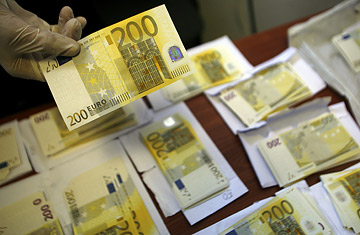
Fake Euro notes seized in Sofia during a special police operation.
A government riddled with corruption and a country beset by crime. That's the European Commission's grim verdict on Bulgaria, a nation that was supposed to have cleaned up its act when it joined the European Union 18 months ago.
The Commission, the E.U.'s executive branch, accompanied its damning report on life in the Balkan nation today with the announcement that it is freezing E.U. aid worth nearly $790 million, stripping two Bulgarian agencies of the right to manage E.U. funds, and will order Sofia to write a new penal code to deliver more effective justice. "The fight against high-level corruption and organized crime is not producing results," the Commission said in its report. "Corruption and fraud is affecting the delivery of E.U. financial assistance ... A clear strategy to cleanse the system is needed." A separate report by the Commission's anti-fraud unit, OLAF, accused a crime group of defrauding the E.U. of aid even as Bulgarian authorities looked on.
Bulgaria and Romania were subject to special monitoring when they joined the E.U. in January 2007, because neither country was considered fully ready to meet the Union's probity standards. But while Romania was criticized in today's report, the Commission is not stopping aid to Bucharest. (Bulgarians grumble that Romania is just as corrupt, but has been smarter at marketing its reforms and hiding the abuses).
Romania's southern neighbor is a different matter. Already the E.U.'s poorest member state, Bulgaria has been counting on substantial E.U. help, including $11 billion of structural assistance over the next five years, to maintain economic growth and encourage foreign investment. "These reports are a reality check," European Commission President José Manuel Barroso said today. "The institutions and systems are now in place but tangible results need to be achieved in investigating, prosecuting and judging cases of high-level corruption and organized crime."
There is little doubt that the situation is dire. Since 1990, more than 150 people in Bulgaria have been killed in contract killings linked to corruption and organized crime, but there has not been a single conviction in any of those cases. Sofia's central cemetery is dotted with marble monuments engraved with life-size portraits of underworld figures known by sinister names like the Doctor, the Russian or the Godfather. Senior government officials have leaked files to mafia suspects and the interior minister himself had to resign after he was found consorting with two dubious businessmen. Ten Bulgarian MPs were stripped of immunity from prosecution last year because of alleged involvement in corruption.
The Commission report says Bulgaria's new anti-corruption agencies are effectively toothless and that there is no political will to deal with the fraudulent mishandling of E.U. funds. In one recent example, in February, police busted a criminal ring that had allegedly skimmed $11.8 million in E.U. farm subsidies by buying secondhand equipment for the meat-processing industry and presenting it as new.
But Bulgaria's plight is also a failure for the E.U. The lure of E.U. membership is often held up as the best way to get countries to reform. The chance to join Europe is one reason Serbia saw to it that wanted Bosnian Serb strongman Radovan Karadzic was arrested this week. Serbian authorities can now look forward to new trade agreements, and to starting the long and laborious process of joining the E.U.
But while Bulgaria showed some reformist zeal in the run-up to joining the European club, momentum quickly slipped once Sofia was in, despite repeated warnings from Commission officials that lack of progress could hurt funding. This proves that "E.U. membership is no magic bullet, " says Diana Kovatcheva, Bulgarian head of anti-corruption group Transparency International. "The lack of administrative and management capacity and political will to undertake substantive anti-corruption measures hamper their success and enforcement." In the past, wayward new members have avoided punishment because Brussels' attention has slipped. The Commission's new tougher approach will establish whether punishment can set Bulgaria on the straight and narrow.
